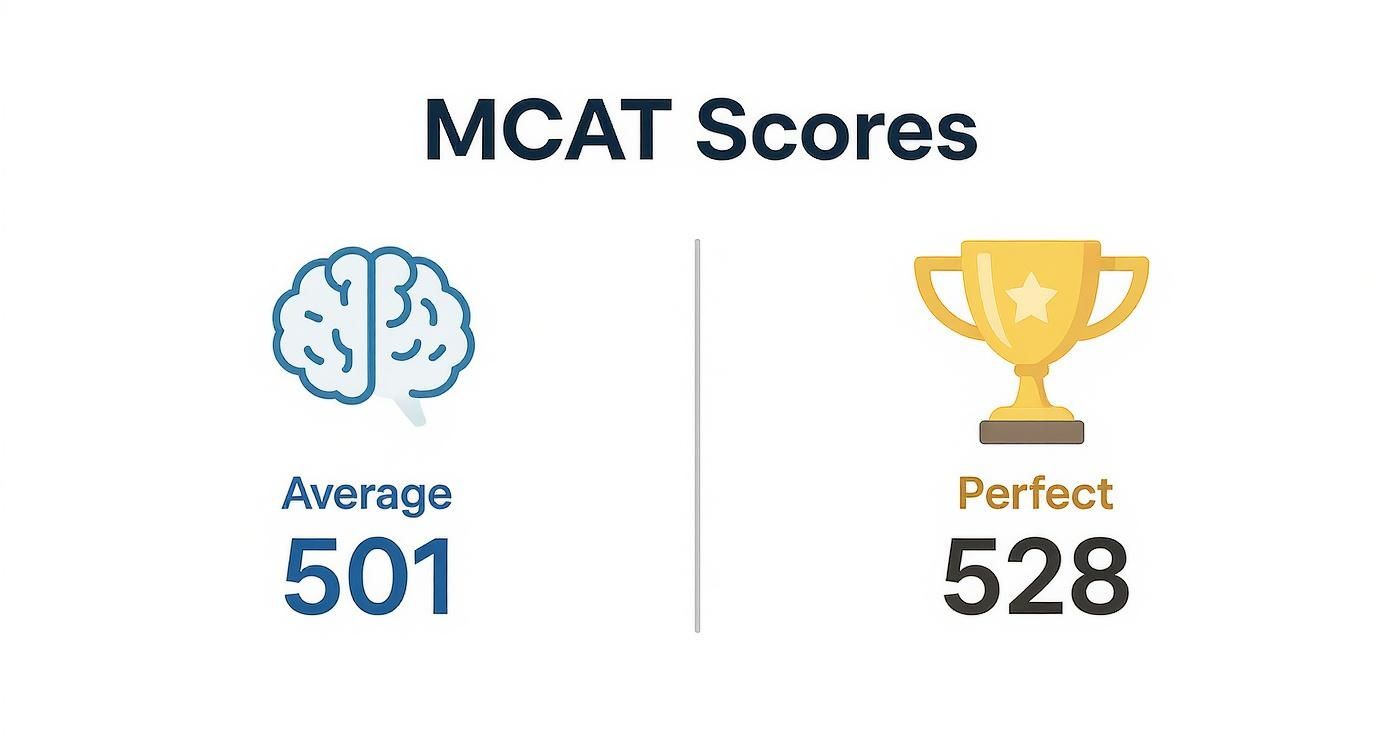Let's cut right to the chase: a perfect MCAT score is a 528. That’s the highest number you can possibly get on the Medical College Admission Test. Think of it as the ultimate grand slam of your pre-med journey—an incredibly rare and impressive feat.
What Does a Perfect MCAT Score Actually Mean?
Scoring a perfect 528 means you’ve hit the absolute peak of performance. But what's behind that number? The MCAT isn't just one test; it’s four distinct sections, each designed to push your knowledge and critical thinking skills to the limit.
To earn that perfect score, you have to nail a 132—the maximum possible score—on all four of these sections:
- Chemical and Physical Foundations of Biological Systems
- Critical Analysis and Reasoning Skills (CARS)
- Biological and Biochemical Foundations of Living Systems
- Psychological, Social, and Biological Foundations of Behavior
Getting a 132 on each one shows you’ve achieved an exceptional level of mastery across a massive range of scientific and analytical fields. It’s no small task.
Hitting the 100th Percentile
A 528 score lands you squarely in the 100th percentile. This doesn't just mean you did well; it means your score was higher than practically every other person who took the exam. The full scoring scale runs from 472 all the way up to that perfect 528.
Statistically, only a tiny sliver of test-takers—far, far below 1%—reach this level each year. This makes a 528 an extraordinary and genuinely rare accomplishment.
A perfect score isn’t just about getting questions right. It's about consistently outperforming nearly every single one of your peers on a national exam built to challenge even the brightest minds.
When an admissions committee sees a score like that, it sends a clear signal: this applicant has an exceptional academic foundation. It immediately makes an application stand out, even in the most competitive pile. For more insights on where your own score might fall, you can learn more about what makes a good MCAT score.
Understanding MCAT Scores and Percentiles
Getting a score of 528 on the MCAT is a huge accomplishment, but that number doesn't tell the whole story. To really get what it means, you have to understand how the AAMC takes your raw performance, turns it into a scaled score, and—most importantly—assigns it a percentile rank. This whole system is designed to make sure every student gets a fair shake, no matter which version of the test they take.
Think of it like running a marathon. Your final time is your scaled score—a hard number showing how you did. But your percentile rank is where you placed compared to everyone else running that day. Finishing in the 99th percentile means you were faster than 99% of the other runners. That tells a much more powerful story than your time alone.
This is exactly how medical school admissions committees look at your MCAT score. The percentile is the key piece of data that shows how you stack up against thousands of other bright, dedicated students all vying for the same spots.
From Raw Score to Scaled Score
It all starts with your raw score, which is simply the number of questions you got right in each of the four sections. The AAMC then uses a process called "equating" to convert that raw score into a scaled score for each section, ranging from 118 (lowest) to 132 (highest). This conversion adjusts for any tiny differences in difficulty between test versions, ensuring fairness across the board.
This infographic breaks down the difference between the average MCAT score and a perfect one, really driving home how big of a jump a top score is.

As you can see, hitting a perfect 528 is a massive leap from the average score, which is what makes it so exceptional. Finally, your four section scores are added together to get your total MCAT score, landing somewhere between 472 and that perfect 528. If you're curious about where different scores fall on the spectrum, you can check out our guide on what is a good MCAT score.
MCAT Scaled Score to Percentile Rank Conversion
The table below gives you a clear picture of how competitive the MCAT really is. It shows how different scaled scores translate into percentile ranks, so you can see exactly where you stand.
| MCAT Scaled Score | Approximate Percentile Rank |
|---|---|
| 524 – 528 | 100th |
| 518 – 523 | 95th – 99th |
| 514 – 517 | 88th – 94th |
| 510 – 513 | 78th – 87th |
| 506 – 509 | 66th – 77th |
| 502 – 505 | 52nd – 65th |
As the numbers show, even a few points can make a huge difference in your percentile rank. Scoring above a 517 puts you in the top 10% of all test-takers, a benchmark that really gets the attention of admissions committees.
What a High MCAT Score Actually Does for You
Let’s get real. While a perfect 528 is the technical mountaintop, the question every premed is really asking is: what score makes me a serious contender? In the hyper-competitive world of med school admissions, the game isn't about perfection; it's about being undeniably competitive. A high score is like a master key—it unlocks doors to top-tier programs and makes admissions officers sit up and pay attention.
Think of your application as a team. Your GPA, research, clinical hours, and personal statement are all key players. But a killer MCAT score? That's your star quarterback. It can elevate the entire application, sometimes even making up for a slightly lower GPA. It sends a clear signal to admissions committees: this applicant has the academic horsepower to handle the rigors of medical school.
What the Data Reveals
The numbers don't lie. In the 2021–2022 admissions cycle, the average MCAT for students who actually got in (matriculants) was 511.9. Compare that to the average applicant's score of 506.5. That gap is where med school dreams are made or broken.
Even better, data shows a clear link between test performance and med school success. Students scoring between 510 and 513 have a 98% progression rate to their second year. You can dig into more of the data on the correlation between MCAT scores and medical school success if you're a numbers person.

This doesn't mean you need a perfect score. Not at all. But it absolutely shows how different score tiers directly impact your acceptance odds. Hitting the 515+ range, for example, catapults you into a highly competitive bracket for many of the most sought-after MD programs.
A "good" MCAT score isn't just a number; it's a strategic tool. It validates your academic abilities and convinces admissions committees that you're a safe bet—someone who is more than ready for the challenges ahead.
Ultimately, aiming high on the MCAT isn’t just about clearing a hurdle. It’s about strategically positioning your entire application to win.
Why a Perfect Score Is Not a Golden Ticket
It’s the hard truth every pre-med student needs to hear: a perfect 528 is an incredible achievement, but it doesn't automatically unlock an acceptance letter. Medical schools aren’t just looking for great test-takers; they're looking for future physicians. This is where the concept of holistic review comes into play.
Admissions committees are building a diverse class of individuals, not just collecting high scores. They view your MCAT score as one chapter in a much larger story about who you are. A perfect score attached to a weak overall application can easily be passed over for a well-rounded candidate with a strong—but imperfect—score.
More Than Just a Number
Think of your application as a puzzle. Every piece needs to fit together to create a complete picture. While the MCAT is a huge piece, it’s balanced against several other critical elements that show who you are beyond the numbers.
Here are the other key pieces of that puzzle:
- Grade Point Average (GPA): This shows your academic consistency and dedication over several years of demanding coursework.
- Clinical and Research Experience: This is your proof of hands-on exposure to medicine and scientific inquiry. It shows you know what you're getting into.
- Personal Statement and Essays: This is where you tell your unique story. It's your chance to share your motivations, reflections, and what drives you.
- Letters of Recommendation: These are endorsements from mentors who have seen you in action and can vouch for your character and abilities.
A perfect MCAT score proves you can master the science, but your experiences, essays, and recommendations prove you have the empathy, resilience, and character to be a doctor.
Statistically, even a 528 is just one impressive data point. Top-tier medical schools see average matriculant scores in the 510–515 range, making a perfect score truly exceptional. But this is always considered alongside your GPA, extracurriculars, and interview performance. This balanced approach means your entire profile matters.
If you want to dig deeper, you can find more insights into how admissions committees evaluate applicants at the National Library of Medicine.
How to Set Your Personal MCAT Score Goal

While chasing a perfect MCAT score is a tempting ambition, the real game-changer is setting a personal score goal that’s locked in on your specific dreams. This simple shift turns a vague wish into a concrete target, giving your entire study plan a powerful sense of direction.
The right score for you is the one that makes you a genuinely competitive applicant at the medical schools you actually want to attend. Nothing more, nothing less.
So, where do you start? With some good old-fashioned homework. Create a list of medical schools that excite you. Then, for each one, dig up the average MCAT score and GPA of their most recently admitted class. This data is your single most valuable tool for setting a goal that’s both realistic and effective. You can typically find this info on the schools' websites or in the AAMC's Medical School Admission Requirements (MSAR) database.
Creating a Balanced School List
Once you have your data, it's time to sort your list into three distinct tiers. This isn't about limiting yourself; it's about building a smart, balanced application strategy.
Your school list should look something like this:
- Reach Schools: These are the top-tier programs where your stats might be a hair below their average. Getting in will be a challenge, but it's definitely not impossible with a standout application.
- Target Schools: This is your sweet spot. Your GPA and target MCAT score fit right in with the average accepted student here.
- Safer Schools: These are programs where your academic profile is comfortably above their average for admitted students, giving you a much higher probability of acceptance.
Setting a data-driven goal lets you focus your energy where it matters most. It transforms an abstract number like 528 into a personalized action plan. With a clear target, you can build an incredibly effective MCAT study schedule designed to get you the exact score you need.
To help you get a clearer picture of what this looks like, here’s a breakdown of typical score ranges for different types of medical schools.
Sample MCAT Score Goals for Different School Tiers
The competition for medical school is fierce, and your MCAT score is a major factor. The table below shows the average MCAT score ranges for matriculants at various tiers of U.S. medical schools. Use this as a guide to see where your target score might place you.
| School Tier | Average Matriculant MCAT Score Range |
|---|---|
| Top 20 Research Schools (e.g., Harvard, Johns Hopkins) | 520 – 524 |
| Top 50 Research Schools | 516 – 519 |
| Mid-Tier Allopathic (MD) Programs | 510 – 515 |
| Lower-Tier Allopathic (MD) Programs | 506 – 509 |
| Osteopathic (DO) Programs | 504 – 507 |
Remember, these are averages. Your GPA, research experience, and personal statement all play huge roles, but this table gives you a solid benchmark for setting a competitive MCAT goal based on the schools you’re aiming for.
Setting a score goal isn't about limiting your potential; it's about building a smart, data-driven roadmap to medical school. Your goal score should be ambitious enough to push you but realistic enough to be achievable.
Of course, reaching that goal requires more than just knowing the material. You also need peak cognitive function during those long study hours. Working to improve focus and concentration is just as crucial as memorizing metabolic pathways. It’s this holistic approach that will open the doors to your future in medicine.
Where Your MCAT Score Fits in the Bigger Picture
So, is chasing a perfect 528 the be-all and end-all? While it’s an incredible goal, it’s crucial to see it for what it is: one powerful component of a much larger story.
Getting into medical school isn't a single sprint; it's more like a triathlon. Think of your MCAT score as the swim, your GPA as the bike ride, and your experiences as the marathon. You have to be strong across all three to really compete.
The "perfect" score isn't a single number. It's the score that makes your specific application impossible to ignore. A 528 won't rescue a profile with zero clinical exposure, but a compelling, well-rounded application with a 515 often stands out to admissions committees for all the right reasons.
What to Do Next
As you push forward, keep these core ideas front and center:
- Build a Complete Profile: Don't let MCAT prep become an excuse to neglect everything else. Keep volunteering, stick with your research, and find meaningful clinical experiences that remind you why you're doing all this.
- Set Smart, Data-Driven Goals: Look up the average MCAT scores for your dream schools. Use that data to set a target that’s ambitious but realistic. Your goal should fuel your study plan, not paralyze you with anxiety.
- Aim for Your Personal Best: The MCAT is a beast of an exam, but it's a manageable one. The real goal isn't abstract perfection; it's achieving a score that truly reflects your potential and strengthens the unique story you're telling.
See the MCAT not as a final judgment on your worth, but as a strategic tool. It's your chance to prove you're academically ready. Use it to open the door, then win them over with a memorable story built from your experiences, essays, and interviews. That’s how you get in.
Frequently Asked Questions About MCAT Scores
Once you get your score report, a whole new set of questions usually pops up. Let's walk through some of the most common ones that pre-med students ask as they figure out their next move.
How Long Are My MCAT Scores Valid?
In most cases, your MCAT scores are good for three years. But keep in mind, this can sometimes vary from one medical school to another.
For example, if you take the test in April 2025, your score should be perfectly fine for the 2028 application cycle at the majority of schools. It's always a smart move to double-check the specific admissions requirements for every school on your list, just to be safe.
Should I Retake a Low MCAT Score?
Deciding whether to retake the MCAT is a big deal, and it's not a decision to take lightly. A retake makes the most sense if something seriously threw you off on test day—maybe you had a panic attack or woke up sick. It’s also a strategic move if your score is way below what you were hitting on practice tests and doesn't line up with the expectations of your target schools.
A retake is only a good idea if you have a solid plan to tackle your weaknesses. Just hoping for a better score without changing how you study is a recipe for disappointment.
Before you even think about re-registering, you need to do a serious post-mortem on what went wrong the first time. For a much deeper look into making this call, check out our guide on how to improve your MCAT score.
At Ace Med Boards, we specialize in personalized tutoring designed to help you crush the MCAT and get into your dream medical school. Find out more at https://acemedboards.com.
